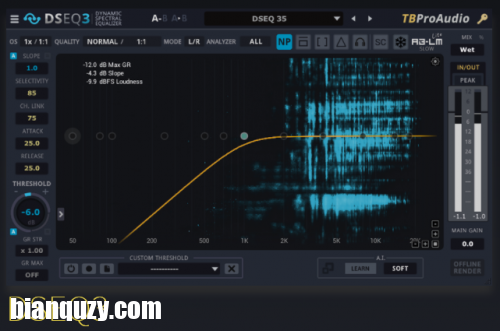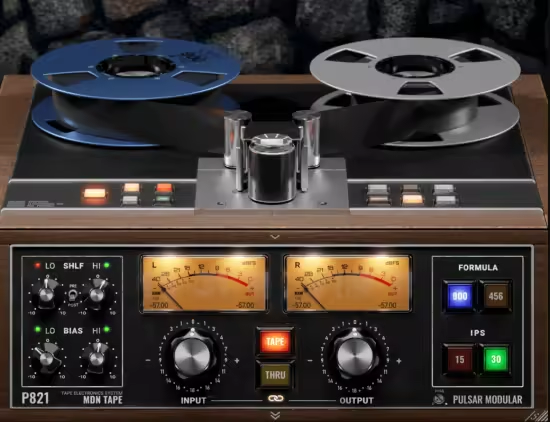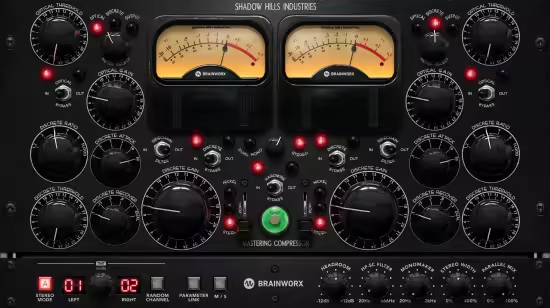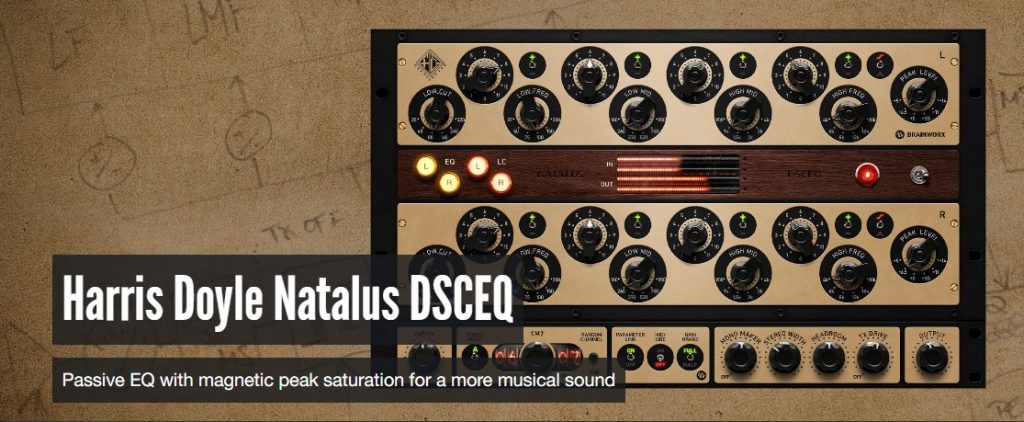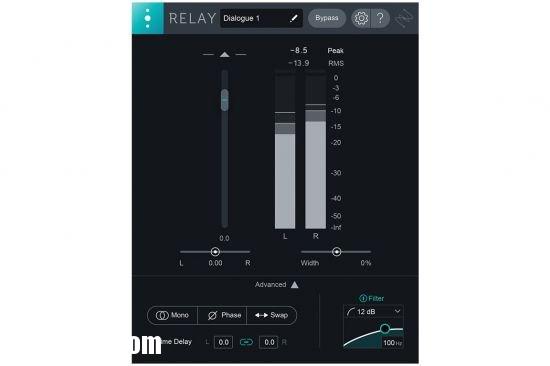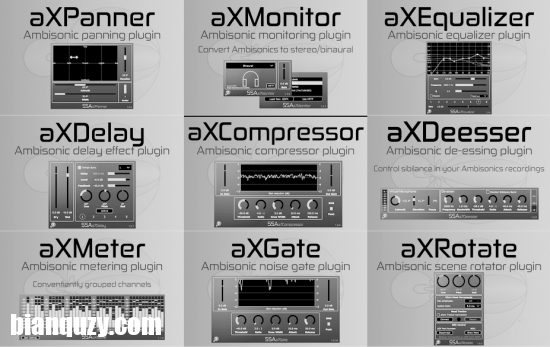
摩卡| vst3 / aax | 28 MB
SSA Plugins为音频工程师和艺术家制作空间音频工具。我们专注于Ambisonic插件,旨在使它尽可能容易的创意。
aXPlugins套件
aX Ambisonics套件为您提供了与空间音频和沉浸式音频一起工作的完整信号链的工具——从编码到解码,以及介于两者之间的大量内容。
aX套件包括用于Ambisonics缩放和监控的插件,可以让您进入空间音频的世界。
它还包括直接用于您的双耦合信号的效果:延迟,均衡器,压缩,噪声门和deesser。
Ambisonics是什么?
双音是一种空间音频格式,出现于20世纪70年代。从那以后,它的受欢迎程度经历了几次上升和下降,但随着虚拟现实(VR)的出现,它正在复苏。事实上,Ambisonics现在被互联网上一些最大的视频平台所使用:YouTube和Facebook!
双相onics是如何工作的?
双元学工作有三个步骤:编码、处理和解码。编码阶段将您的单声道或立体声轨道转换(使用插件如aXPanner)为b格式——一种多声道格式,其中声道之间的增益和极性关系由源位置(方位角和仰角)决定。b格式独立于播放阶段,不能直接收听。一阶双向电子学(FOA)有4个通道:W(全向)、X、Y和Z(沿笛卡尔轴)。
处理步骤是你操作你的声源,无论是单独的还是作为一个组。这种操作可以包括动态范围压缩、EQ-ing、添加延迟等效果。你也可以同时旋转所有东西。当然,b格式信号必须小心处理,以避免破坏空间信息。aX插件的设计就特别考虑到了这一点。
解码步骤将b格式转换为扬声器或耳机信号。耳机解码(目前最方便和常用的收听方法)是通过头部相关传递函数(hrtf)。这些模仿了头部和耳朵的声学特征。这被称为双耳解码,在aXMonitor系列中可用。这种解码器的目的是创造一个听起来真实的场景,而不是像耳机上的普通立体声那样“在头脑里”。适合沉浸式VR!解码到扩音器要求你在一个(理想的)球体周围有相当多的扩音器,这是一个令人惊叹(但昂贵)的声音体验。
什么是高阶双耦合?
高阶双相电路(HOA)扩展了b格式通道的数量,从而提高了声音场景的空间分辨率。Ambisonics的阶数理论上可以达到无穷大,但实际上DAW插件被限制为七阶(64个通道)。
特定阶的HOA信号包含任何低阶子集所需的所有相同通道。例如,三阶信号包含一阶和二阶通道,就好像您已直接按该阶编码。只需要去掉末端对应高阶分量的通道就可以将其向下混合到低阶。简单!
这意味着,即使超出了当前项目的要求,也要以最高的可用顺序(以及您的CPU可以处理的顺序)进行混合。为什么?因为你将得到所需的低阶信号,但如果/当解码需求提高时,你也可以返回并获得更高的空间分辨率信号。这是最好的方式,以未来证明你的双元学工作!
为什么在虚拟现实中使用(高阶)双耦合?
(高阶)双元技术是一种基于场景的技术,这意味着它可以有效地对整个场景进行处理。例如,你的最终混音可能会有几十个声源,你想要响应终端用户的动作。双声源可以让你将声场作为一个整体进行旋转,而不必为场景中的每个声源进行旋转。
Ambisonics目前用于YouTube 360和Facebook360的空间化。它也可以在即将到来的VLC媒体播放器3.0版本中使用。这为将你的VR内容带给更多用户提供了巨大的可能性。因为音频是让用户沉浸在VR场景中的关键,所以学习如何使用Ambisonics是值得的。为了帮助你,我在这里整理了一个简短的教程。
这个版本有什么新内容吗
官方网站没有提供任何关于这个版本的变化的信息。
系统需求
Windows 7或更高版本
主页
主页
MOCHA | VST3/AAX | 28 MB
SSA Plugins makes tools for audio engineers and artists working with spatial audio. We specialise in Ambisonic plugins aimed at making it as easy as possible to be creative.
aXPlugins Suite
The aX Ambisonics Suite provide you with the tools for a full signal chain working with spatial and immersive audio – from encoding to decoding and plenty in between.
The aX Suite includes plugins for Ambisonics panning and monitoring to get you into the world of spatial audio.
It also includes effects to use directly on your Ambisonics signals: delay, EQ, compression, noise gate and deesser.
What is Ambisonics?
Ambisonics is a spatial audio format that has been around since the 1970s. Since then, its popularity has risen and fallen a few times but is undergoing a resurgence with the emergence of virtual reality (VR). In fact, Ambisonics is now used by some of the biggest video platforms on the internet: YouTube and Facebook!
How does Ambisonics work?
Ambisonics works in three steps: encoding, processing and decoding. The encoding stage takes your mono or stereo track and converts (using a plugin such as the aXPanner) it to B-format – a multichannel format where the gain and polarity relationship between the channels is determined by the source position (azimuth and elevation). B-format is independent of the playback stage and can’t be listened to directly. First order Ambisonics (FOA) has 4 channels: W (omnidirectional), X, Y and Z (along the Cartesian axes).
The processing step is where you manipulate your sound sources, either individually or as a group. This manipulation can include dynamic range compression, EQ-ing, adding effects such as delay, etc. You can also rotate everything at the same time. Of course, the B-format signals have to be treated carefully to avoid destroying the spatial information. The aX Plugins were designed specifically with this in mind.
The decoding step converts from B-format to loudspeaker or headphone signals. Decoding for headphones (currently the most convenient and common listening method) is via Head Related Transfer Functions (HRTFs). These mimic the acoustic characteristics of the head and ears. This is known as binaural decoding and is available in the aXMonitor series. The aim of this sort of decoder is to create a scene that sounds realistic, not “inside the head” like normal stereo over headphones. Perfect for immersive VR! Decoding to loudspeakers requires you to have quite a lot of loudspeakers in (ideally) a sphere around the listening area and is an amazing (but expensive) sonic experience.
What Is Higher Order Ambisonics?
Higher Order Ambisonics (HOA) extends the number of B-format channels thus increasing the spatial resolution of the sound scene. The Ambisonics order can theoretically go to infinity, but in practice DAW plugins are limited to seventh order (64 channels).
HOA signals of a particular order contain all of the same channels required for any lower-order subset. For example, a third order signal contains the first and second order channels as if you had encoded directly to that order. Just drop the channels at the end corresponding to the higher order components and you’ve down-mixed to lower order. Easy!
What this means it is always best to mix in the highest order available (and that your CPU can handle) even if it is above the current requirements for the project. Why? Because you will have the lower order signals needed but you will also be able to go back and get the higher spatial-resolution signals if/when the decoding requirements improve. It is the best way to future-proof your Ambisonics work!
Why use (Higher Order) Ambisonics for VR?
(Higher Order) Ambisonics is a scene-based technique which means that it is possibly to apply processing to the whole scene efficiently. For example, your final mix will probably have dozens of sound sources that you want to respond to movements made by the end-user. Ambisonics lets you rotate the sound field as a whole, rather than having to do this for each individual source in your scene.
Ambisonics is currently used for spatialisation in YouTube 360 and Facebook360. It is also available in the upcoming version 3.0 of VLC Media Player. These offer massive possibility for bringing your VR content to a large audience. Since audio is key to a users immersion in a VR scene it is worth learning how to use Ambisonics. To help you, I have put together a short tutorial here.
Whats new in this version
Official site does not provide any info about changes in this version.
System Requirements
Windows 7 or higher
Homepage
